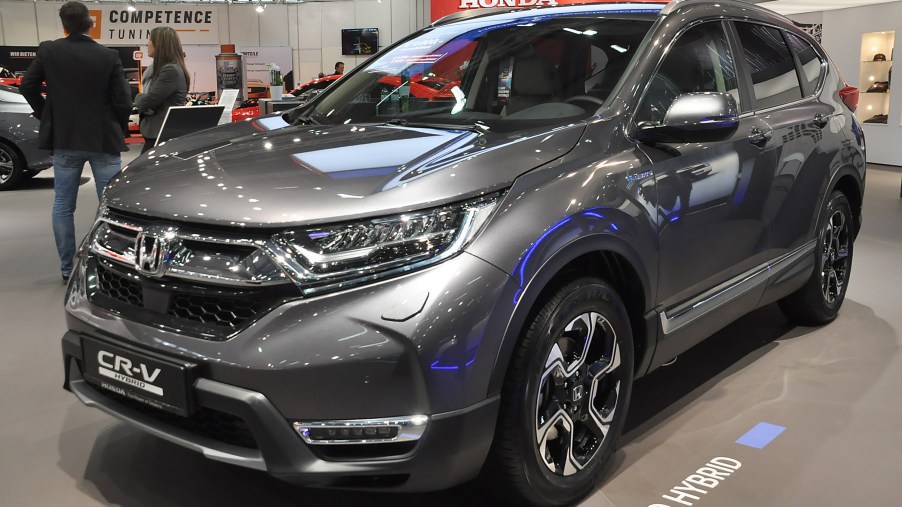
Should You Upgrade to the 2020 Honda CR-V Hybrid Over the Non-Hybrid?
Honda is primed with yet another top-selling vehicle in its lineup. The Honda CR-V is already a popular crossover, but new this year is the hybrid version. It’s the first-ever hybrid CR-V offering in the U.S., and the experts are already weighing in with support.
Despite the success of the gas-powered CR-V, the hybrid variant is bringing a whole new set of perks to the table. Consumers will have to decide now if the hybrid is worth the upgrade.
The 2020 Honda CR-V vs. the Honda CR-V hybrid
Both the Honda CR-V and the CR-V Hybrid have a ton of features in common, and the two present significant similarities. According to many of the reviews, both crossovers drive the same, offer quiet rides and almost identical equipment.
Both have Android Auto and Apple CarPlay connectivity, six-speaker sound systems, and seven-inch touchscreens. Seating is spacious, even for three adults with ample legroom.
Why there is so much expert buzz around the Honda CR-V Hybrid
It’s all about what’s under the hood. The traditional, non-hybrid CR-V comes equipped with a 1.5L turbo-4. The CR-V Hybrid carries a 2.0L inline-4, along with batteries and electric motors, according to Edmunds. The CR-V Hybrid is also all-wheel-drive. The gas portion of the engine powers the batteries while the electric motors drive the SUVs wheels.
It’s a slightly different layout than how most automakers configure their hybrid models, which has an innovative approach to fuel economy. The hybrid version generates 212 horsepower, which is more than the gas-powered engine’s 190 horsepower, for an added bonus.
Does the fuel efficiency make the hybrid a better buy?
The 2020 Honda CR-V is already a top fuel-efficient contender in this class. Even the all-wheel drive variations earn an overall 29 mpg combined rating. The CR-V Hybrid, with its electric motors, earns 40/35/38 mpg.
Its city rating is higher than the traditional CR-V, making it a potential game-changer for consumers who spend a great deal of behind the wheel time in city driving environments. At higher speeds, the gas portion of the hybrid kicks in, thus the less efficient highway data.
Which CR-V the experts suggest buying
So, the question still remains. Is it worth upgrading to the Honda CR-V Hybrid? In terms of dollars and cents, it could very well be. Based on The Car Connection’s road test and expert review, the hybrid variation proved to be more fuel-efficient.
In their testing, they logged more than 150 miles of drive time on both models, sampling highway speeds, and city traffic environments. The CR-V Hybrid earned a 38.8 mpg average while the regular CR-V saw 30.1 mpg. When you translate that into dollars, the gurus say consumers could roughly expect to save $4.00 each week at that rate.
If more of your daily driving is in that stop-and-go, city driving range, you could save more. When comparing base model purchase prices for each, the CR-V Hybrid runs an average of $1,200 more than the gas CR-V. Of course, different trim levels will reflect varying MSRPs. So your savings and overall cost comparison will be based on what equipment and extras you’ll want your CR-V to have.
When it comes down to vehicle buying preferences, both the traditional Honda CR-V and the CR-V Hybrid look a lot alike. But it’s their differences that will determine which is the better buy for you.
Based on the fuel efficiency ratings, engine configurations, and price tags, it seems the CR-V Hybrid may present as the more valuable buy. The experts are banking on it being a dominating force in the crossover space. And Honda’s certainly made it easy to make the switch.


